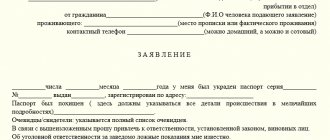How to obtain alimony without court?
Registration of alimony without trial is possible if the party is voluntarily ready to pay alimony or provide for their child, or a notarial agreement has been concluded between the parties on the basis of which the party is obliged to pay the described amount exactly on time; it can be executed by a notary. Also, the parties sometimes resort to drawing up a receipt, on the basis of which the person will also have to pay alimony.
When is alimony court required?
When the plaintiff does not know the income and place of residence of the defendant, a detailed investigation will be conducted and a court decision on alimony will be made. If this data is present (certificate of income, specific address of the defendant), a simplified scheme with the issuance of a court order is possible. In this case, the presence of the second party is not required (more details on the issue of issuing a court order for the collection of alimony by reference).
How to win a trial?
Depends on what grounds the ex-spouse cited in the claim. For example, as practice shows, the birth of another child is not a reason to reduce child support. The plaintiff's claims are denied, arguing as follows:
- The amount of alimony is below the minimum subsistence level established in the region and cannot be reduced.
- The applicant has not proven (documented) that he financially supports the newly born baby.
- The ex-husband lives with another family, on which the remaining 75% (if a second child is born) of earnings is already spent.
Family law and the court initially side with the interests of mothers who raise children on their own. This gives a small (and sometimes large) advantage in winning arguments with ex-husbands.
Of course, in order to defend the child’s rights in court, the mother will have to present:
- A certificate from the mayor's office about the cost of living in the region for an adult and a child.
- A certificate of your own income for the last 3-6 months.
- Information (in writing) about the cost of school supplies, clothing, classes in the section.
If you disagree with the plaintiff’s arguments, you can state at trial that there is no evidence that the plaintiff financially supports the second child. Of course, if he did not attach to the application an order assigning alimony for the second child or an agreement with the new spouse.
Deterioration in health is a basis that requires careful documentation. A regular medical certificate from a clinic is not enough. Disability, deterioration in health, which resulted in loss of ability to work or previous professional suitability, is supported by the conclusion of a medical social examination (MSE). Without it, the ex-husband's claim will be denied. Therefore, in court, the defendant needs to focus on this.
But even the presence of all the certificates, decisions or orders assigning alimony for another child does not mean that the court will satisfy the claim. If the husband filed for a reduction in alimony, how to win in court is a difficult question more for him, and not for his ex-wife. Often the demands of ex-husbands are rejected for the following reason :
- They are employed in low-paid jobs;
- There is no evidence that the plaintiff was looking for a job with more decent wages.
Quite a fair statement. If a man decides to take a responsible step and have another child, he is obliged to provide decent financial support for all his children. Single mothers can use this argument to defend themselves in court.
How to prepare for child support court?
When drawing up an application to the court for child support, it is necessary to collect evidence and confirm the existence of expenses for the child. The document must reflect the required amount per year. This is necessary so that the court for collecting alimony has the opportunity to calculate the state fee (however, on a general basis for the applicant in such cases, it is not charged, but is collected when a decision is made by the second party). You can specify a flat amount or a percentage of the defendant’s income.
What documents are needed for alimony in court? In addition to calculating child support costs, do not forget to copy and attach the following documents to your application:
- Birth certificate of children who are common with the Defendant and for whose maintenance claims are made
- Certificate of residence or other evidence that children live with you
- Documents about the marriage with the Defendant and information about its dissolution (if the marriage took place)
- Other documents that you consider necessary to attach to prove the amount of alimony
Rules for collecting alimony in court
A person who has the right to receive alimony has the right to apply to the court with a demand for the collection of alimony, regardless of the period that has expired from the moment the right to alimony arose, if the latter was not previously paid by agreement (Clause 1 of Article 107 of the Family Code of the Russian Federation).
Rules for collecting alimony in court:
- alimony is awarded from the moment you go to court (paragraph 1, paragraph 2, article 107 of the Family Code of the Russian Federation);
- alimony for the past period can be recovered within a three-year period from the date of going to court
, if the person obliged to pay alimony evaded paying it, despite the measures taken by the plaintiff (paragraph 3, paragraph 2, article 107 of the Family Code of the Russian Federation); - the court has the right to make a decision on the collection of alimony before the court decision enters into legal force, and when collecting alimony for minor children - before the court makes a decision on the collection of alimony (Clause 1 of Article 108 of the Family Code of the Russian Federation);
- the presence of alimony obligations in family relations between the subjects at the time of alimony collection or before;
- the presence of conditions provided for by law or agreement of the parties for the emergence of alimony obligations (disability, need, “unemployment” of the person requiring alimony).
How to write an application for alimony to the court?
An application for alimony to the court is drawn up in free form in written or printed form. The most important thing when writing an application is to determine the amount of alimony; it will depend on the status of your spouse (former) or with whom you lived in a civil marriage. The amount of alimony will be determined based on whether your spouse officially works or not, or is in non-working status.
The application must indicate the following:
- Name of the court and parties (address of the court, full name of the parties (plaintiff and defendant, address);
- Indication of the parties, indication of the minor child for whom alimony will be established, with whom he lives, who provides for the child and other important things that the plaintiff intends to indicate (for example, that the defendant does not help with money);
- The amount of alimony (determined on the basis of family law), the specific amount of alimony is indicated, the date from which the plaintiff requests the accrual of alimony;
- Reference to legislation (i.e. on what basis the plaintiff makes his claims);
- Attached documents to the application (the most important document should be evidence that the children are fully supported by you, these could be checks for which you bought food, clothes for children, various receipts, including payment for kindergarten);
- You can also indicate the bank details of the plaintiff, where the defendant will transfer funds, or indicate what he will transfer in cash.
Which court should I file for alimony?
We are often asked how to apply for alimony? It's simple. It is necessary to file a claim with the court for alimony at the place of residence of the person from whom it will be collected. However, this category of cases may use the concept of alternative jurisdiction. This allows you to contact the judicial authorities at the place of residence of the plaintiff, for which the latter provides evidence of his residence with the child at the location of the territory under the jurisdiction of a certain judicial authority.
You will have to visit your ex's court for child support and pay the funds, even if you were in a civil marriage. The key factor in such cases is the presence of children.
ATTENTION: collection of alimony by court decision may be carried out before its adoption. The judge has the right to order payments at any time from the moment the claim is accepted. The difference between the funds paid and the amount established in the decision is not returned to the defendant. A similar scenario is possible if the subject of the dispute is payments for the maintenance of a minor child.
Collection of alimony through court
Currently, alimony for a minor, including a student, can be collected through the court if the person who is obliged to support the child does not provide him with financial assistance voluntarily.
You can do this in the following ways:
- file a claim;
- write a statement requesting a court order.
These two methods have a number of significant differences.
The statement of claim will require more time, since it will be considered, court hearings will be held (maybe more than once) or interested parties will be summoned to them. They may be representatives of other legitimate children who are maintained by the person from whom alimony must be collected.
After a court decision is made, the plaintiff can immediately receive a writ of execution, without waiting for this decision to come into force.
The statement of claim is also used in cases where the plaintiff intends to collect child support not from parents, but from brothers, sisters, grandparents.
An application for a court order is submitted only in cases where there are no aggravating circumstances in the case. These include:

presence of interested parties;- the need to recognize or challenge paternity/maternity.
But this type of treatment also has its advantages. First of all, the speed of processing the application. It is considered within five working days, and the parties are not summoned to court. After this, the applicant receives a writ of execution, on the basis of which alimony will be collected.
Where to contact?
In order to apply for child support, you should contact a magistrate, and the application can be sent both to the place of residence of the plaintiff and the defendant.

If the case is complex, during which it will be necessary to determine not only the amount of alimony, but also to establish paternity/maternity, deprive of parental rights or resolve other problems, then in this case you should contact the district court.
Currently, no state fee is charged when considering such cases.
What to say at a child support trial?
Before the court hearing itself, the court always schedules a preliminary court hearing, where it invites the parties to familiarize themselves with the case materials, determine whether all the evidence in the case has been collected, determines whether the parties wish to enter into a settlement agreement, and clarifies various important issues that will allow the case to be considered correctly and in a timely manner. essentially.
The court must find out all the substantive circumstances in order to assign alimony. The most important questions the court asks are:
- Are the parents of a minor child in an official marriage/common law/divorce?
- Who does the minor child live with?
- What funds are used to provide for the child?
- What is the defendant’s working/non-working status? Does he agree with the plaintiff’s demands, which he indicated in the application?
The above questions are the most common ones in court, but there are other questions depending on the nature of the case.
Judicial proceedings to consider a case can be carried out by order and in the usual (claim) manner. If the case is being considered in a lawsuit, then the parties need to prepare for legal arguments and find out for themselves what exactly needs to be said in court.
The plaintiff in court should say the following:
- you can describe your entire family life with a minor child, indicate that you provide him financially (name where the money goes, provide confirmation)
- say what kind of relationship you have with your spouse
- name the amount of your demands (alimony) (why you consider this amount to be correct and fair)
The defendant in court should say the following:
- if money was spent on a minor child (for example, without confirmation, then you need to name no matter where and what it was spent on, what was purchased)
- indicate agreement/disagreement with the plaintiff’s demands, justify your demands
- name what salary you receive, or where you get money for living
You must always say everything accurately at a court hearing (depending on your situation and your position), even if there is no evidence, but let’s say a witness can confirm some information. During the court hearing, a record of the process is kept, so your words may influence the court's decision.
Duration of the order
The process of obtaining an order is regulated by Chapter 11 of the Code of Civil Procedure of the Russian Federation. A potential recipient of alimony maintenance must write an application to the court to formulate an order. After submitting the documents, all that remains is to wait for the court decision.
The order must be applied to the Magistrates' Court. It may be issued subject to the following conditions:
- there are no additional disputes between parents (about paternity, amount of child support, residence of children, etc.);
- The claimant has information about the place of work and earnings of the alimony-obligated citizen.
With the help of a court order, a mother can obtain child support only for minor children. To obtain alimony payments for adult incapacitated and incapacitated children, you will have to go to court with a claim and prove your need.
When alimony is issued by issuing a court order, alimony is withheld only in proportion to wages. If the claimant claims alimony payments in a fixed sum of money or a mixed form of payments, then he should file a claim in court. The alimony recipient will have to prove the need for the chosen deduction method and justify the amount.
To obtain an order, the court should provide as much information as possible about the alimony-obligated citizen. You need to know his full name, place of work, address details (registration and residence).
Alimony payments can be collected through writ proceedings only if the potential alimony payer does not have alimony obligations to other citizens. In addition, the debtor must reside within the country.
In order to obtain child support for minor children by order, the following actions will be required from the claimant:
- write an application for an order;
- prepare the necessary package of documentation (original documents or their copies with notarization are attached to the application);
- deal with territorial jurisdiction;
- send the prepared package of documentation with the application to the magistrate’s court;
- wait for the court order to be issued;
- go with him to the bailiffs, who, on the basis of the application, initiate the opening of enforcement proceedings against the debtor with the subsequent withholding of alimony.
The amount of alimony payments collected through a court order is determined as follows:
- one child – 25% of salary;
- two children – 33% of salary;
- three or more – 50% of income.
In accordance with Art. 127 of the Code of Civil Procedure of the Russian Federation, the text of the judicial document indicates its validity period. In the case of collection of alimony payments, the end of the validity period is determined by the day when the child turns 18 years old.
The alimony recipient can send a court order to the FSSP department on any day before the child reaches adulthood. Also, an adult child himself, for 3 years after turning 18, can turn to bailiffs to collect alimony debt from his father.
The alimony recipient was issued a court order. What to do with him? In accordance with the legislative acts defining the procedure for writ proceedings, the claimant may choose one of the following methods of withholding alimony:
- the document can be submitted to bailiffs at the place of residence of the person liable for alimony;
- the order can be sent to the accounting department at the place of work of the alimony worker.
If it is more convenient for the claimant to contact the FSSP to withhold alimony payments, then the original writ of execution will need to be attached to the application for opening enforcement proceedings against the alimony-obligated person.
The request for the transfer of court documents can be indicated in the application for the issuance of an order. In this case, the court will independently send the order to the bailiffs. The petition may also be submitted later.
Some employers avoid independently withholding child support payments in favor of minors. In this case, the order should be given to bailiffs. They will send the necessary documentation to the employer. After receiving it, he will be required to begin withholding alimony payments from the alimony worker’s earnings. If this does not happen, then you should send a complaint to the bailiffs. Then you can go to court.
The judge initiates the return of documentation to the applicant in the following cases:
- if the application is accompanied by an incomplete package of documentation confirming the citizen’s right to alimony maintenance and to receive an order;
- the applicant did not comply with the requirements for the document, which were set out earlier.
We invite you to read: Calculation of alimony for three years
Can alimony be awarded without a defendant?
Alimony can be awarded to the plaintiff without summoning the defendant to court on the basis of writ proceedings. Writ proceedings are carried out without calling both parties to court, that is, the case is considered without the plaintiff and the defendant, only a court order is issued, which is issued to the plaintiff and on its basis the defendant will pay alimony.
The court may award alimony without a defendant if:
- If the defendant does not dispute the amount of alimony and agrees with them (i.e., agrees to pay such amount of alimony);
- If paternity is not insisted upon or disputed;
- If you agree with the child’s living conditions (for example, you agree that a minor child will live with his mother);
- Based on these conditions, the court order will be accepted quickly in the shortest possible time and the plaintiff will be able to receive child support.
How to obtain a court order for alimony?
A court order is a document that simultaneously contains the characteristics of a court decision and an executive document. On its basis, the claimant has the right to apply for the initiation of enforcement proceedings by contacting the bailiffs with the appropriate package of papers.
Obtaining this document is carried out through a procedure established by law on the basis of the Code of Civil Procedure, Chapter 11.
The claimant (in this case, the recipient of alimony or his representative) submits an application for extradition with attachments and waits for a response from the court.
Extradition, regardless of the nature of the dispute, is carried out by magistrates. As a general rule, a court order is issued in situations:
- when there is no dispute between the parties about the right - there are no disputes about paternity or the amount of alimony;
- when the payer's income is known and confirmed.
A court order can be issued when collecting alimony as a percentage of the payer’s earnings. If a recovery is planned in a fixed amount or a mixed order, the order cannot be made - this is considered a dispute about the right to a fixed amount of alimony.
Help: A potential payer can easily cancel a court order. In this case, the judge issues a ruling that explains the right to file a claim in court justifying one’s claims. It is noteworthy that to cancel a court order, no reasons or evidence are required - the simple desire of the debtor is sufficient.
The collection of alimony by order is regulated by:
- The Family Code of the Russian Federation, which defines general issues relating to alimony legal relations and the amount of payments;
- The Code of Civil Procedure, which regulates the judicial procedure, including regarding the issuance of an order;
- Federal Law “On enforcement proceedings, on the basis of which the actual execution of the act is carried out.
How long does child support court last?
If the case is considered in writ proceedings, then the court order is issued within 5 working days from the receipt of the application without summoning the parties, but if the case is considered in a lawsuit, then the case can drag on for a long time, depending on both parties, on the evidence provided and the court.
Based on the law, an application for alimony in a claim must be considered no later than two months, in a shortened period no later than a month (in special cases).
The claim procedure lasts much longer than the order, since the parties are obliged to participate in the trial, evidence is being considered, and the opinions of the parties are heard. The court on alimony may be extended longer than two months, for example, when the court left the case without progress to collect the necessary evidence or to establish an examination, then in this case the case will be resumed only after the provision of evidence and the examination.
Our alimony lawyer will represent your interests in court, regardless of the complexity of the case.
How to pay alimony based on a court decision?
In the court decision, the court establishes the amount of alimony and the period during which this payment is made; it may also indicate the date of each month during which the defendant must transfer alimony for the maintenance of the child. The decision may indicate that the defendant will independently transfer alimony according to the bank details indicated by the plaintiff, or transfer it independently.
The plaintiff, with a court decision or court order, can also contact the bailiff service or the organization (enterprise) where the defendant is employed so that money is withheld from him. The bailiffs and the organization will transfer funds to you based on the decision.
Debt collection for the previous period
Funds that were due by law, but were not paid previously, can be obtained as part of the collection of alimony for the past period. As a result of consideration of the application, the recipient will be awarded a compensation payment.
It is possible to collect debt for the past period if the parties did not enter into an agreement earlier. The amount of payment is set by the judge.
The court decision on the assignment of payment is transferred to the bailiff service.
In the same way, you can collect a penalty for alimony. Its size is established in Art. 115 RF IC. It is equal to 0.5% of the debt amount for each day of delay.
Can the court refuse alimony?
Based on the law, parents are obliged to provide for their children, but situations arise when the court may refuse to establish alimony for a party. The court has the right to refuse to establish alimony in the following cases:
When paternity of a child has not been established (for example, there is no blood relationship between the defendant and the child), in this case, paternity must first be established.
The occurrence of circumstances on the basis of which the child lost the opportunity to receive payments (for example, marriage at the age of 16, or the child began engaging in entrepreneurial activity at the age of 16);
The defendant has the right not to pay money (for example, he proved in court that he is incapacitated, for example, a disabled person).
How can you refuse child support and terminate the agreement?
Refusal to pay child support is possible in the following cases:
- death of one of the parties;
- the occurrence of grounds for refusal provided for in the terms of the agreement;
- the child reaches the age of majority;
- restoration of the legal capacity of the person involved in alimony relations;
- adoption of a child to whom alimony was paid;
- challenging the fact of paternity;
- marriage of the alimony recipient.
There are no other cases for voluntarily refusing to pay alimony.










